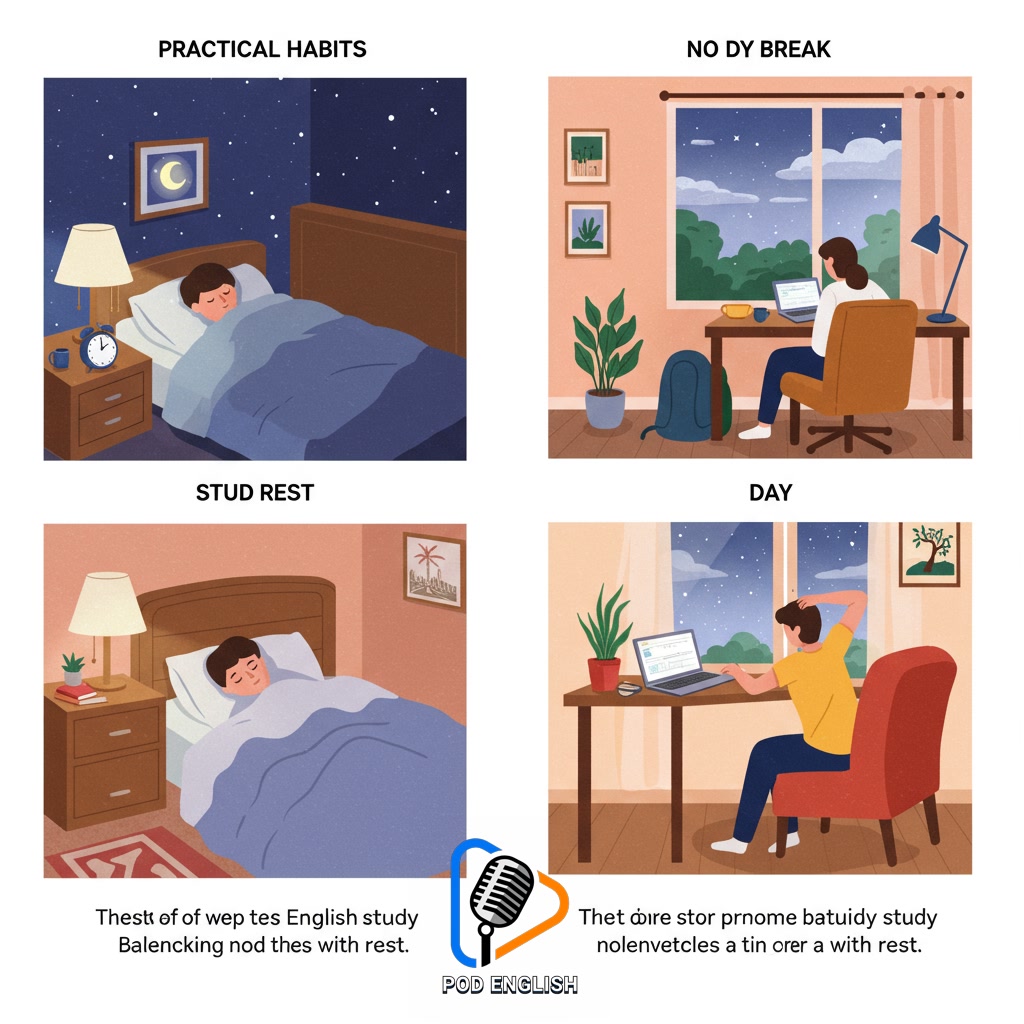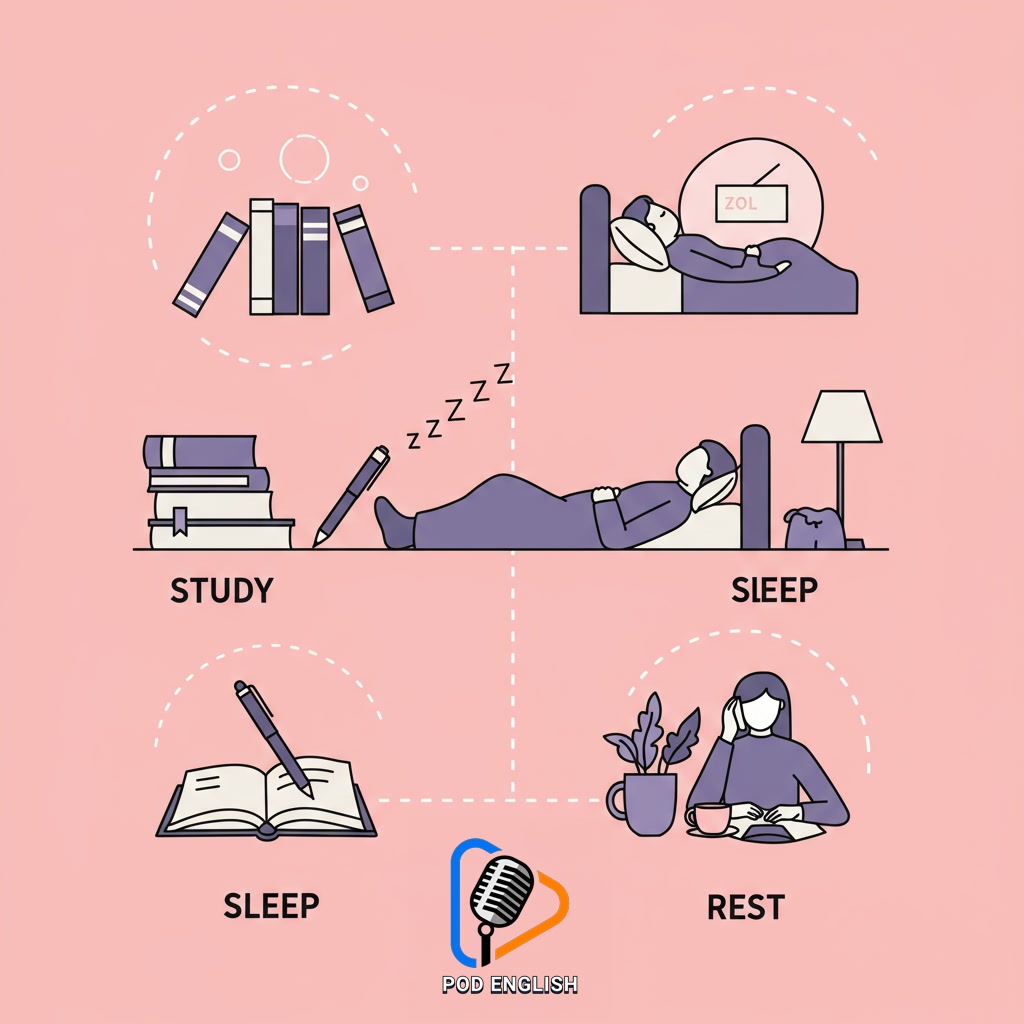Learn English
Maximize English Learning Sleep and Rest for Performance

Optimizing sleep and rest is fundamental for effective English learning. Adequate sleep aids memory consolidation, which is essential for retaining new vocabulary and grammar. Rest periods improve focus and cognitive function, vital for processing and practicing the language. By prioritizing sufficient rest, individuals can significantly enhance their overall performance and progress in learning English.
Table of Contents
- Section 1: Understanding the Link: Sleep, Rest, and English Learning Performance
- Section 2: The Science of Sleep: How it Boosts Memory and Cognitive Skills for Language Acquisition
- Section 3: Practical Strategies to Optimize Sleep and Rest for Better English Learning
- Section 4: Integrating Productive Breaks and Downtime into Your English Study Routine
- Section 5: Creating a Balanced Schedule: Study, Sleep, and Rest for Maximized Learning
Section 1: Understanding the Link: Sleep, Rest, and English Learning Performance
Adequate sleep and dedicated rest periods are not merely beneficial but fundamental to optimizing your English learning journey. During sleep, your brain actively works to consolidate memories formed while you were awake. This process is critical for transferring new vocabulary, grammar rules, and sentence structures from temporary storage into long-term memory, making recall and application much easier. Similarly, incorporating short, focused rest breaks into your study routine prevents mental fatigue. When you are well-rested, your cognitive functions, such as attention, concentration, and problem-solving, are significantly enhanced. This improved mental clarity allows you to absorb new information more effectively, understand complex concepts more readily, and engage in practice activities with greater focus, ultimately accelerating your progress and improving your overall performance in learning English.

Section 2: The Science of Sleep: How it Boosts Memory and Cognitive Skills for Language Acquisition
Building upon the idea that sleep consolidates memories, the science reveals a deeper process. During specific sleep stages, particularly slow-wave sleep and REM sleep, your brain actively replays and strengthens neural connections formed while you were awake and learning. This is crucial for moving new English vocabulary, grammar rules, and pronunciation patterns from temporary storage into long-term memory. Beyond memory, sleep also enhances cognitive functions vital for language acquisition, such as attention span, problem-solving abilities, and the capacity to process complex information. Adequate rest literally rewires your brain to become more efficient at understanding, retaining, and utilizing the English language.

Section 3: Practical Strategies to Optimize Sleep and Rest for Better English Learning
Transitioning from the science of sleep’s role in memory, let’s explore concrete ways to leverage rest for improved English learning. To optimize sleep, establish a consistent sleep schedule, even on weekends, to regulate your body’s internal clock. Create a relaxing bedtime routine that signals your brain it’s time to wind down, perhaps avoiding screens an hour before bed. Ensure your sleep environment is dark, quiet, and cool. Additionally, incorporate short, focused rest breaks throughout your study sessions. Stepping away from the material for 5-10 minutes every hour can prevent burnout, improve concentration upon return, and allow your brain brief moments to process information passively. These simple habits directly support the memory consolidation and cognitive function crucial for mastering English vocabulary, grammar, and fluency.

Section 4: Integrating Productive Breaks and Downtime into Your English Study Routine
Following the importance of sleep, incorporating productive breaks and downtime is equally crucial for sustaining focus and preventing burnout during English study. Instead of pushing through fatigue, strategic short breaks can significantly enhance retention and motivation. During these breaks, step away from your study materials. Engage in light physical activity, listen to relaxing music, or simply rest your eyes. Downtime, such as spending time outdoors or pursuing a non-language-related hobby, allows your brain to process information subconsciously and return refreshed. These periods aren’t wasted time; they are essential components of an effective learning strategy, helping you return to your studies with renewed energy and better concentration, ultimately leading to more efficient English acquisition.

Section 5: Creating a Balanced Schedule: Study, Sleep, and Rest for Maximized Learning
Building on the importance of breaks, creating a balanced schedule that effectively integrates dedicated study time with sufficient sleep and rejuvenating rest is fundamental for maximizing your English learning potential. Simply pushing through fatigue is counterproductive; instead, strategic planning allows your brain to consolidate new information learned during study periods, primarily while you sleep. Adequate rest throughout the day prevents mental exhaustion, maintaining focus and cognitive function necessary for absorbing complex grammar and vocabulary. Structure your day or week by allocating specific blocks for focused English practice, ensuring you get the recommended amount of sleep (typically 7-9 hours), and deliberately scheduling short breaks and longer periods of rest or leisure. This holistic approach supports long-term retention, prevents burnout, and makes the learning process more sustainable and enjoyable.














